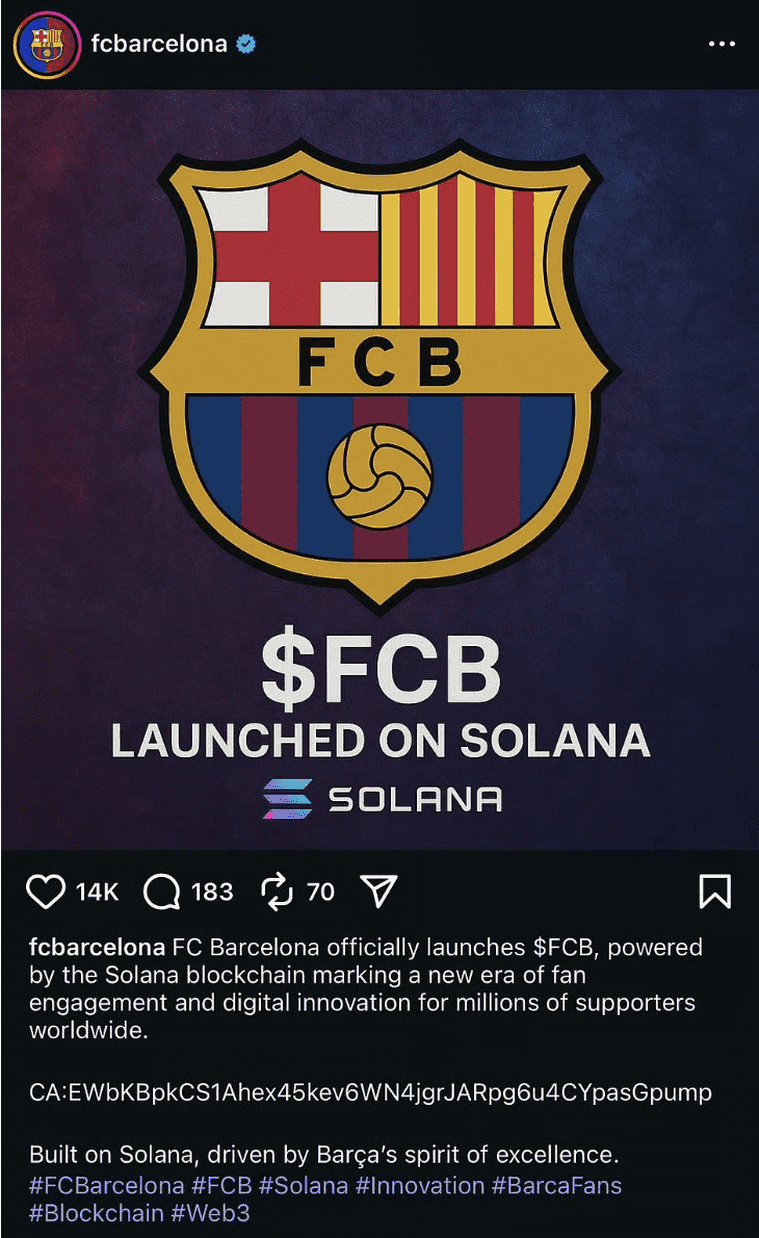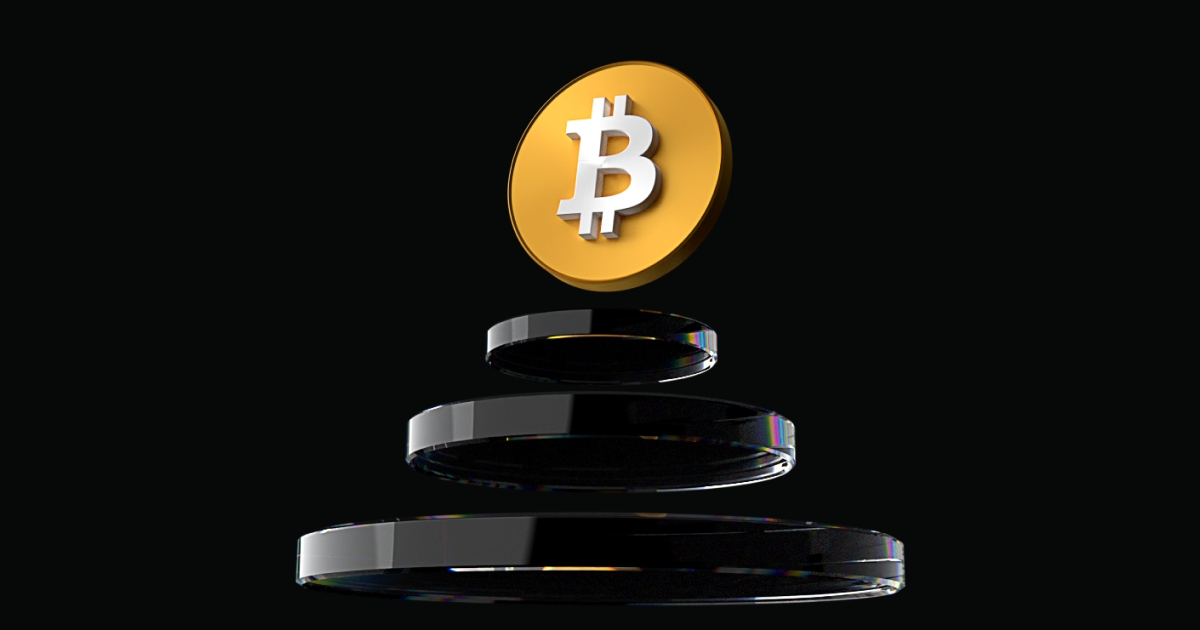What Is FCB Coin — The Fake Token Behind Barcelona’s Instagram Hack?
In early October 2025, FC Barcelona’s official Instagram account — followed by more than 144 million fans worldwide — shocked supporters with an unexpected announcement. The post claimed the club was launching a new cryptocurrency called “FCB Coin,” supposedly built on the Solana blockchain to mark a “new era of fan engagement and digital innovation.” Complete with the club’s crest and polished graphics, it looked every bit like an authentic marketing campaign. Within minutes, thousands of fans began liking and sharing the post, believing the world-famous football club had officially stepped into the crypto arena.
But it was all a scam. Hackers had taken control of the verified account and used it to promote a fake Solana-based token, hoping to lure unsuspecting supporters into sending money to fraudulent wallet addresses. The deception mirrored a string of recent high-profile cyberattacks — Disney’s Instagram had been hijacked days earlier to push a fake “Disney Coin,” and the UFC’s account had previously been used in a similar stunt, briefly driving a token’s market cap to $11 million before it crashed, netting hackers roughly $1.4 million. For FC Barcelona, this incident served as a stark warning of how easily global trust can be weaponized in the fast-moving intersection between football fandom and crypto fraud.
From Post to Panic — The Timeline of the FCB Coin Instagram Hack

The breach occurred on the morning of October 7, 2025, when followers of FC Barcelona’s official Instagram noticed an unfamiliar post. It featured the club’s crest, vibrant visuals, and a caption announcing:
“FC Barcelona officially launches $FCB, powered by the Solana blockchain — marking a new era of fan engagement and digital innovation for millions of supporters worldwide.”
The message urged fans to buy the new FCB coin and even included what appeared to be a Solana wallet address for the token’s “presale.” To the untrained eye, the announcement seemed legitimate — its wording mirrored the club’s usual tone for global partnerships and sponsorships. But subtle inconsistencies gave it away: the image quality was poor, comments were disabled, and the post appeared without any mention on Barcelona’s website or X (Twitter) feed.
Within minutes, crypto-savvy users began sounding the alarm. “BREAKING: FC Barcelona’s Instagram has been hacked. Do NOT connect your wallet or buy $FCB — it’s fake,” one viral tweet warned. The club’s media and IT teams reportedly acted within a few hours to regain control, removing the fraudulent post and securing the account. According to early cybersecurity analyses, the scam content remained live for up to four hours before it was deleted — long enough for some fans to fall into the trap.
By that afternoon, the account had returned to normal, posting routine training photos and match content as if nothing had happened. Yet the brief incident left thousands of supporters confused and uneasy, wondering how such a world-class organization could be compromised so swiftly.
The Fake FCB Coin Scam Explained
So, what exactly was FCB Coin?
In reality, it was a completely fake token, hastily created by scammers with no connection to FC Barcelona whatsoever. The attackers exploited the Solana blockchain’s low entry barrier — where anyone can mint and list a token within minutes — to fabricate a counterfeit “$FCB” coin. They then leveraged Barcelona’s hacked Instagram to lend the project false legitimacy, posting the token’s contract address and encouraging fans to “get in early” before prices surged.
The scam followed a well-known pump-and-dump pattern. Once the fraudulent post went live, thousands of curious users visited Solana-based meme-coin platforms such as Pump.fun, which has become a frequent launchpad for these quick-turnover schemes. Blockchain data suggests that the token’s market capitalization spiked from roughly $5,000 to nearly $900,000 in just a few hours — a surge driven entirely by social-media hype. Predictably, the scammers then dumped their holdings, selling hundreds of millions of FCB tokens in one sweep. The price crashed by more than 98%, wiping out nearly everyone who had bought in.
This wasn’t the first time such a strategy worked. Similar social-media hacks earlier in the year — including one that used the UFC’s Instagram account — allowed scammers to pocket an estimated $49,000 to $1.4 million in quick profits. In the Barcelona case, the FCB Coin operation likely generated tens of thousands of dollars before the post was removed.
Importantly, the Solana network itself wasn’t compromised. The vulnerability lay in social engineering — tricking people, not breaking code. By gaining access to a trusted account, the attackers could instantly broadcast credibility to millions. Cybersecurity experts believe the hackers may have stolen session tokens or credentials through phishing, possibly by sending a fake Instagram-support email to one of the club’s admins. With control secured, they could post freely and disable comments to reduce the chance of immediate detection.
What Happened Next: Official and Public Responses to the FCB Coin Scam
After swiftly regaining control of its account, FC Barcelona removed all fraudulent posts related to FCB Coin. The club refrained from making a detailed public statement immediately, likely to prevent amplifying the scam, but internal sources confirmed that the media and cybersecurity teams had launched an internal investigation. Reports indicated that Instagram’s parent company, Meta, was assisting with the review to determine how the breach occurred and to strengthen account protection measures.
While Barcelona did not directly address victims, their actions — restoring the account and resuming normal posting within hours — made it clear that the crypto promotion was entirely unauthorized. Fans were urged by community moderators and independent cybersecurity experts to avoid engaging with any FCB token and to treat similar “official-looking” announcements with skepticism unless verified through the club’s official website or press releases.
Across the wider crypto and tech communities, the response was swift and blunt. Security researchers on X (formerly Twitter) and Solana developers highlighted that such social-media hijackings are becoming alarmingly common. “Hacking popular accounts to promote meme coins or pump-and-dump schemes isn’t new — it’s just faster and more sophisticated now,” wrote one analyst quoted by Decrypt. Others pointed out that the FCB Coin scam bore striking resemblance to earlier incidents, including the UFC’s hacked account, which was used to push a fake token that briefly reached an $11 million valuation before collapsing.
Experts also emphasized that nothing was wrong with the Solana blockchain itself; rather, the weakness lay in human security lapses and insufficient two-factor authentication (2FA) protections on high-traffic accounts. A representative from the Solana community reiterated that “$FCB has no affiliation with FC Barcelona or Solana Labs” and encouraged users to verify contract origins and cross-check announcements before interacting with any token.
How Fans Can Protect Themselves from Similar Scams
High-profile breaches like the FCB Coin incident reveal just how easily online trust can be exploited. Whether you are a football fan, crypto enthusiast, or casual social media user, learning to identify and avoid these scams is essential. The following lessons from the Barcelona case highlight how individuals can stay safe.
1. Verify announcements through official channels
If a club, brand, or celebrity claims to launch a new token, always cross-check the news on official websites or credible media outlets. In FC Barcelona’s case, legitimate fan tokens such as $BAR are announced through verified partners like Socios.com, not via surprise Instagram posts. A real partnership will always be covered by major sports or financial media before it appears on social platforms.
2. Never trust wallet addresses or links in social posts
Fraudsters often include wallet addresses or “buy now” links to encourage instant purchases. Do not connect your crypto wallet or send tokens to any address from social media unless you have confirmed its authenticity through multiple sources. Genuine projects rarely ask users to act immediately or send funds directly.
3. Watch for red flags in content
Low-quality visuals, grammatical mistakes, disabled comments, or posts that seem off-brand are common warning signs. The fake FCB Coin post had several of these clues: poor design, a sudden shift from football to cryptocurrency, and no mention on Barcelona’s website or other verified channels.
4. Strengthen personal and organizational security
Two-factor authentication (2FA) remains one of the most effective defenses against account hijacking. Administrators of high-traffic accounts should also be trained to recognize phishing emails or links disguised as “Instagram Support” or “copyright warnings.” These are common methods used to steal login tokens or credentials.
5. Research before investing
Before purchasing any cryptocurrency, take time to investigate its origin. Look for a whitepaper, identifiable developers, and listings on reliable data aggregators like CoinMarketCap. If a token exists only in social posts and has no independent verification, it is likely fraudulent.
6. Avoid impulsive decisions
Scammers rely on urgency and FOMO—the fear of missing out. A legitimate opportunity will still be available after you verify its legitimacy. Acting cautiously is the most reliable way to avoid becoming a victim of crypto-based social engineering scams.
Conclusion
The FCB Coin incident stands as a striking example of how digital trust can be hijacked in seconds. For FC Barcelona, the temporary takeover of its official Instagram account was more than an embarrassing technical breach—it was a direct attack on the credibility of one of the world’s most iconic football brands. In just a few hours, hackers managed to spread misinformation to millions, exploiting the club’s reputation to push a fake crypto token. The episode revealed how fragile online authenticity has become, and how quickly even a globally recognized institution can become a conduit for deception.
Beyond the immediate damage, the hack underscores a larger vulnerability at the crossroads of sports fandom, social media, and cryptocurrency. As football clubs and major brands increasingly embrace digital innovation, they also widen the surface area for potential exploitation. The takeaway is clear: both organizations and users must evolve faster than the fraudsters. Clubs need stronger authentication systems and dedicated digital-response protocols, while fans must stay skeptical of unverified posts and sudden investment opportunities. The FCB Coin saga ultimately reminds us that in the online world, trust is the most valuable currency—and the easiest to counterfeit. Vigilance, verification, and awareness remain the only real defenses.
Disclaimer: The opinions expressed in this article are for informational purposes only. This article does not constitute an endorsement of any of the products and services discussed or investment, financial, or trading advice. Qualified professionals should be consulted prior to making financial decisions.



